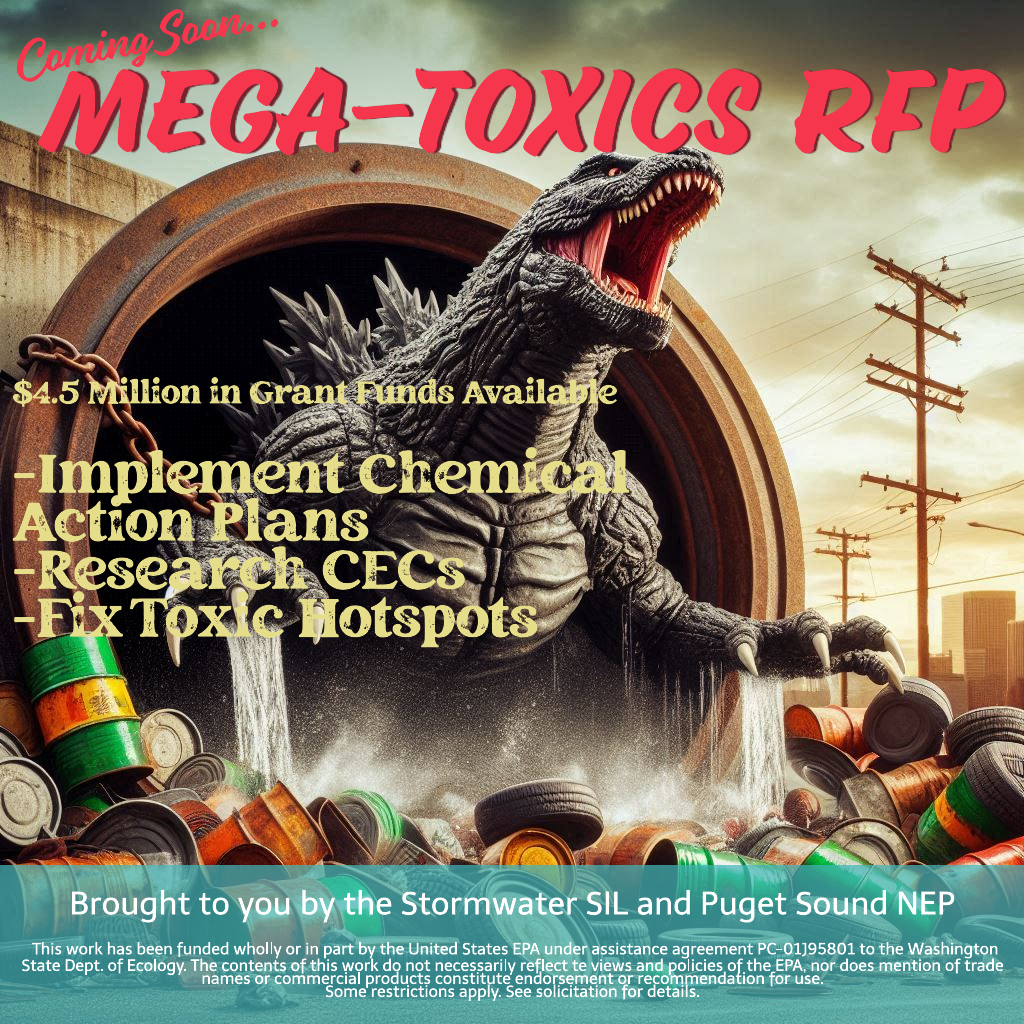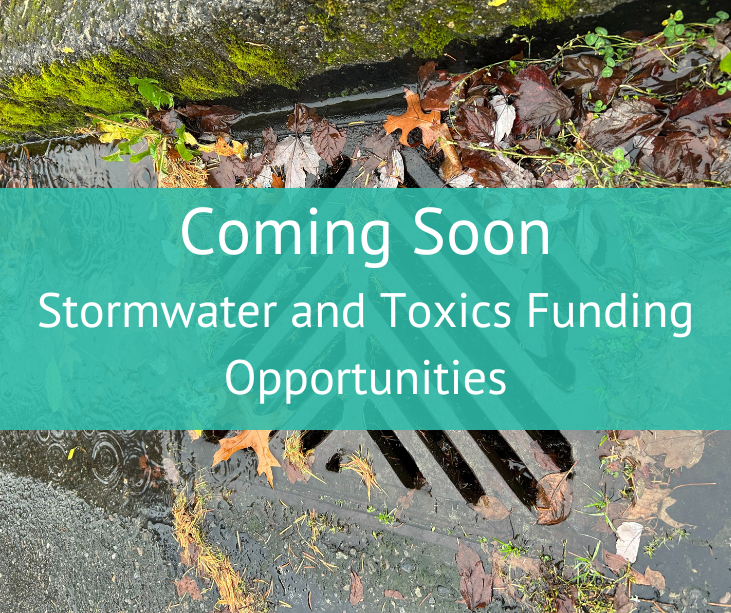The Stormwater SIL will open Requests for Proposals (RFPs) on October 23, with funding opportunities for projects addressing priorities from the 2024 Investment Plan. A total of $8.6 million is available through these RFPs for climate resilience in stormwater, stormwater park and regional facilities planning, and a “Mega-Toxics RFP” addressing three Toxics in Fish priorities. The application period will be open from October 23 through December 31, 2024.
If you are considering an application under one or more of these opportunities, please submit this short “Interest in Applying” form as soon as possible to help us connect you with resources to develop a strong application! We will also offer webinars and office hours for applicants to ask questions and receive feedback on conceptual project ideas during the application period.
The full solicitations and application details for the following RFPs will be available on the Stormwater SIL’s RFP page on October 23, 2024:
BIBI (Freshwater Quality) Priority A – Climate Resiliency in Stormwater Management ($2.5 million available)
The 2024 Climate Resiliency RFP will support stormwater infrastructure analysis, retrofit planning, resilient policy updates, and updated levels of service to address climate resiliency. Projects could address issues such as increased precipitation and flooding, water temperature, water quality impairments, acceleration of erosion, habitat degradation, and streamflow quantity and timing.
Contact: Emily McCartan (emmc461@ecy.wa.gov)
BIBI/TIF Investment Priority F – Developing Stormwater Parks and Regional Facilities ($1.6 million available)
This RFP will fund projects that support master planning and early implementation for regional stormwater facilities (treating stormwater from more than one property), including stormwater parks that provide stormwater treatment along with public access and recreation opportunities. Proposals may address development of one or multiple facilities, with increased funding available for projects that plan to serve more than one site or jurisdiction. Projects may involve activities such as:
- Regional facilities and stormwater park planning to serve new, redeveloping, or retrofit sites within one or more basins;
- Community engagement and feasibility studies to target environmental justice priorities for siting and infrastructure needs;
- Third party review of local public works projects; or
- Studies to identify and address policy barriers to implementing regional facilities.
Contact: Emily McCartan (emmc461@ecy.wa.gov)
TIF Priority A – Chemical Action Plan (CAP) Implementation ($1 million available)
After a successful grant round in 2023, the CAP Implementation RFP is back and better than before. This investment will fund actions supporting the implementation of Chemical Action Plans (CAPs) for priority toxic chemicals including PAHs, PBDEs, PFAS, PCBs, or phthalates, and now includes the 6PPD Action Plan. Action plans identify actions to reduce pollutants for people and the ecosystem (find action plans here).
Contact: Dustin Bilhimer (dbil461@ecy.wa.gov).
TIF Priority B – Contaminants of Emerging Concern (CEC) Research ($1 million available)
We are reopening last year’s RFP for Contaminants of Emerging Concern (CECs) research and including microplastics as a priority CEC to study. In order to understand which CECs are most likely to cause harm and what to do about them, we need regional data from well-informed toxicity assessments, methods development, surveillance monitoring, or pollution prevention and management activities. A recent CEC assessment in Puget Sound (James et al, 2023) identified High Priority CECs likely to be impacting the survival of aquatic life and disproportionately exposing human populations that consume them. They also identified key data gaps and uncertainties regarding the amount and toxicity of CECs in the Puget Sound, their effects on aquatic life, and understanding regarding the level of contamination that aquatic life or humans can tolerate before they are adversely affected (i.e. establishing meaningful thresholds, standards, and recovery targets). Projects could address these data gaps or make a case for others. In addition to field or laboratory research, projects eligible for this funding might include assessing or developing analytical methods for priority CECs.
Contact: Frances Bothfeld (fbot461@ecy.wa.gov).
TIF Priority C – Addressing Toxic Hotspot Impacts on Juvenile Chinook Salmon ($2.5 million available)
This RFP is intended to address the sources and loads of contaminants from wastewater and stormwater runoff in known areas with toxic loads affecting juvenile Chinook salmon productivity, with priority for known contaminants of concern (PBDEs and PCBs). Proposals may also address emerging contaminants of concern if they are contributing to known toxic impacts to the area of concern. Previous research and monitoring have identified hotspots where toxic loads are limiting survival of juvenile Chinook, and likely of other salmonids important for Tribal treaty rights. This funding is intended to:
- Help state, local, and Tribal partners develop potential management plans linking contaminant sources with impacts to Chinook productivity and actions to reduce, eliminate, or mitigate contaminant impacts to salmon;
- Implement actions in an existing clean-up plan; or
- Answer key questions to enable clean-up projects to get funding and move forward in the future.
Contact: Dustin Bilhimer (dbil461@ecy.wa.gov).
Start brainstorming ideas now
We want to know who may be interested in applying for grant funds under this solicitation so that we can better provide grant assistance during the application period. Please complete the Interest in Applying form as early as possible so we can assist you. The Stormwater SIL team will host two online office hours to answer applicant questions and help you prepare the best proposal possible. We encourage first-time and returning applicants to join or to contact the SIL with questions.
- Save the Date for the Mega-Toxics RFP Webinar, Monday October 28, 2024 | 1:00-3:00pm (download calendar invite)
- Webinars for Climate Resiliency and Stormwater Parks/Regional Facilities RFPs to be announced

Did you know?
This opportunity is funded by the EPA Puget Sound Recovery National Program Office. The Stormwater SIL’s Puget Sound Geographic Funds through EPA are intended to support creative and catalytic projects that may be challenging to fund through other sources, but have the potential for transformative impact on water quality or stormwater management, either within a specific local community or at the regional level.

